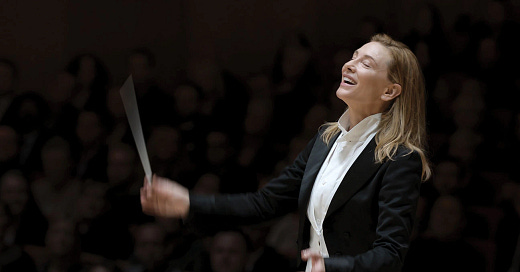Todd Field’s first film in 16 years, Tár, seems like it’s asking something it isn’t asking. The film chronicles the demise of the fictional Lydia Tár, a world renowned composer and conductor, who is essentially cancelled for a series of actions and behaviors that the film intentionally keeps opaque. Whether Lydia has committed crimes, whether she deserves the punishment she receives from the public and her peers, or whether she is a ~good~ person remain irrelevant.
A more impulsive, reactive director — say Lars Von Trier or, on the other end of the spectrum, someone more concerned with treating film like a political stage (I won’t dare name names) — would not hesitate to insert their egos and vitriol into such a movie. Field however, is an observer, more concerned with how time, circumstance and repeated actions all mesh together to create both a perfect arrangement and the self-destruction of a human being.
Tár opens with a Q&A between Lydia and the New Yorker’s Adam Gopnik, as the journalist recites her impressive resume, including being the first woman appointed to principal conductor of the Berlin Philharmonic. The subsequent scene is a masterclass, one that both tells us about Lydia’s career and character. She’s a genius and counts Leonard Bernstein as a mentor. She’s also straightforward, if not a little icy. She’s snarky when Gopnik focuses on her gender, and cracks a joke about the absurdity of being called a Conductoress. It’s Blanchett’s greatest work here, as Lydia not only navigates Gopnik’s questions with restraint and elegance, but also telegraphs exactly where the film is moving. After she’s called a human metronome (derogatory), Lydia, who at first seems to cringe at the label, wholeheartedly adopts it. She lets the audience and Gopnik know what makes her Lydia Tár: in order to be at the top of your game, time is everything. And it’s the interpretation of time that makes the genius. The crowd goes wild, and we next see Blanchett, post Q&A, flirt with a thirsty fan. We begin.
There’s almost something comical about Lydia, or maybe familiar is a better word. During a class at Julliard, where she’s lecturing, we witness her eviscerate one of her students for his reluctance to understand Bach because of the legend’s unsavory cultural history. She’s that person, one who will go on a rampage at any given moment about the importance of separating the art from the artist. She’s the kind of person to never say she’s faced any sort of specific discrimination due to her gender or sexuality, and in fact will resent anyone who assumes so. We get her psychology, and it’s easy to assume (and later learn) that Tár is also a product of the men who mentored her. She moves through the world with the the confidence of someone who has reached the very peak of their potential, and with that she seizes hold of anything she desires— including the young women who fawn over her.
Without getting into the specifics of what Lydia is eventually accused of, we see her actions affect her complicit wife, a violinist in the orchestra who has somehow managed to accept Lydia’s unquenchable desire for power and p… her daughter (who calls her Lydia), and a series of assistants, former mentees, and members of the orchestra itself. Field’s film wisely spends most of the time going through Lydia’s daily routine. It’s as if Jeanne Dielman were a girlboss. We see her boxing. We see her drop off her daughter at school and threaten her bully. We see her play businesswoman with all the investors and personalities that keep her work going. We see her write and fail to write. We also see her flirt, sometimes with her dutiful assistant, and more recently with a new cellist. Then we see it all over again, a bit different.
Time strikes. Her routine shifts. Lydia is, for better or worse (Field doesn’t say), living in a world that’s hypersensitive and hyperconscious of social dynamics. It’s a specific thing that takes her down, but it’s also years of compounded moves that have caught up. It’s her manipulative nature, her vengefulness, and her horny brain working against her. It’s also the #MeToo era, cancel culture, and Gen-Z fragility. And when you add them all together, her time has run out. Field’s doesn’t play this with any specific anger or empathy. It’s just what happens.
It’s difficult to understand what makes Tár so invigorating. Maybe it’s that it’s increasingly rare to watch something that makes you feel uneasy and uncertain. As I was leaving my screening, I overheard two people behind me compare this to the Harvey Weinstein story. That felt reductive, but I also understand that we all have a need to make things digestable. It’s against our natures to hold two things in our brain at once. I think about the many times in my life where I’ve oversimplified something, where I’ve resorted to naming things “good” and “bad.” They’re easier to use, but dangerous. They allow you to gloss over minutiae and keep you in a place of ignorance and absolute certainty. I don’t think anyone should be certain about anything.
Lydia is often cruel and calculated, but she’s also a loving mother and caretaker. It’s hard for me not to also think that we often fail to consider the toll it takes on someone to be responsible for the livelihoods of so many people. And then, she does something disgusting in order to fulfill whatever narcissistic desires take hold of her. She’s then horrible, a monster who has accumulated so much wealth and influence that she’s lost the ability to care. It’s all of this that makes for such a compelling watch. Field’s ask for patience and critical thinking, not a verdict or judgment. I wish more movies did the same.
Tár is playing in theaters on Oct. 7.





